The Complete Commercial Boiler Maintenance Checklist
Categories: HVAC | Maintenance
Whether you’re in charge of a new boiler at your facility or are looking for ways to improve the life of an in-service boiler, getting into the habit of a regular maintenance schedule provides numerous benefits to your system and the facility as a whole. But what makes routine maintenance so important?
Picture your commercial boiler’s needs similar to a car. You know you need regular inspections from a professional, but you also need to fuel it with gas, maintain the washer fluid, get a car wash to remove buildup, vacuum the interior, and keep up with oil changes. When we got our first cars, we may not have considered all the maintenance needs. But, like with a boiler, a lack of regular maintenance can become a hassle when it leads to repair needs and lower efficiency.
Table of Contents
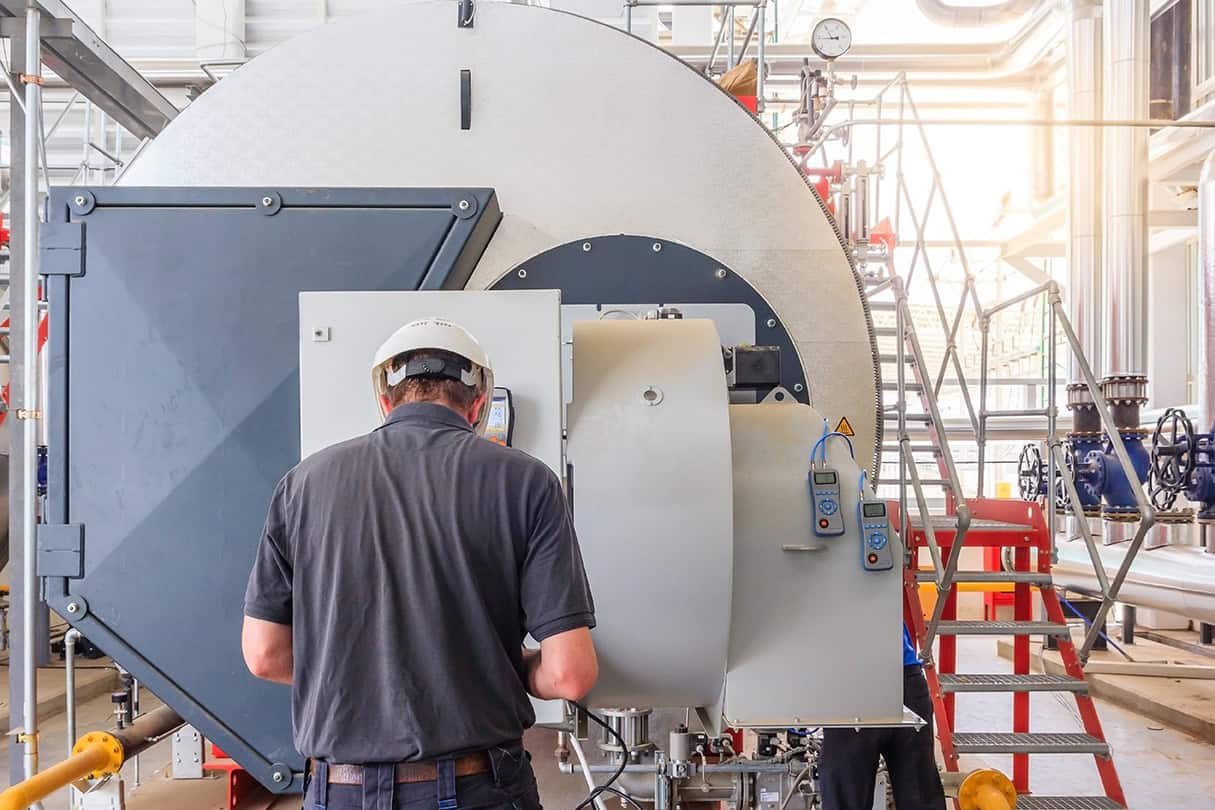
No matter the season, understanding what type of maintenance your facility’s boiler needs is crucial to keeping efficiency up and costs down. While both cost and efficiency are important reasons to keep your boiler in top shape, safety should also be a high priority. Boilers that are not well-maintained pose a greater safety risk in the form of potential explosions and may not live to their fullest lifespan of around 15 years.
Let’s take a closer look at the top benefits of regular boiler maintenance, as well as components you should get familiar with to provide proper maintenance. We’ll also provide a complete checklist of daily, weekly, monthly, and annual maintenance items to always be aware of.
Benefits of Routine Boiler Maintenance
Reduce the Risk of Safety Concerns
Commercial boilers must heat a large amount of space, meaning they are large, powerful machines themselves. When it comes to these systems, a potential safety concern is the risk of a boiler explosion. Although boiler explosions aren’t common, they aren’t impossible. Most commonly, boiler explosions are the result of a buildup of pressure in the boiler.
See how this facility was impacted by a boiler explosion.
Increase Efficiency
Simply put, routine boiler maintenance keeps your system functioning the way it was meant to. By dismissing regular cleanings, inspections, and other maintenance, you run a greater risk of not noticing when something is wrong. Preventative maintenance, similar to regular maintenance, stresses the proactivity of preventing any issues before they arise. Fewer issues mean your boiler isn't working harder than it needs to when heating your space.
Minimize Costs
When you’re keeping up with your boiler’s routine and preventative maintenance, you’re able to better avoid emergency repairs or wasting energy on your system trying to keep up, both of which can cost extra.
Types of Boilers
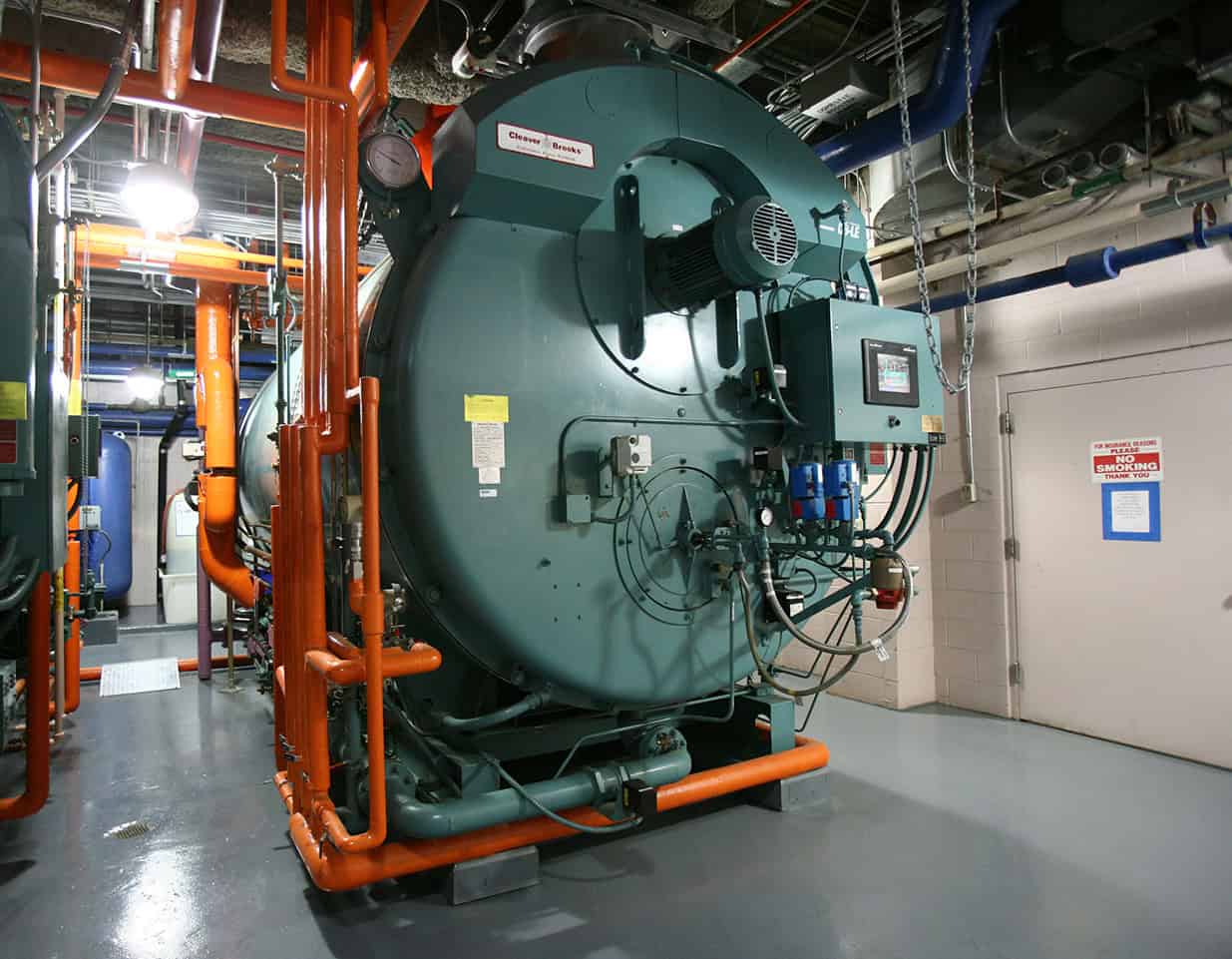
When reviewing a maintenance checklist, note that the maintenance items are general and apply across the board to a variety of boilers. You should research any specific maintenance needs for the type of boiler you have. Popular boiler options include:
- Fire Tube Boilers
- Water Tube Boilers
- Electric Boilers
- Condensing Boilers
Commercial Boiler Considerations
Some components of your boiler will need to be cleaned, inspected, or maintained daily, weekly, monthly, or annually by a designated person in your facility, while some maintenance will need to be handled by a professional. Knowing both when you need a professional’s eye and what components you should be maintaining are important to a successful maintenance routine.
Professional Service
At some point, your boiler is going to need servicing from a professional. This includes internal inspections, visual inspections, and cleanings where the boiler is opened up and serviced.
How often your boiler needs to be serviced by a professional depends on the type of boiler you have, its age, your facility's needs, and other factors. Your service partner may recommend different intervals as the suggestions below are general.
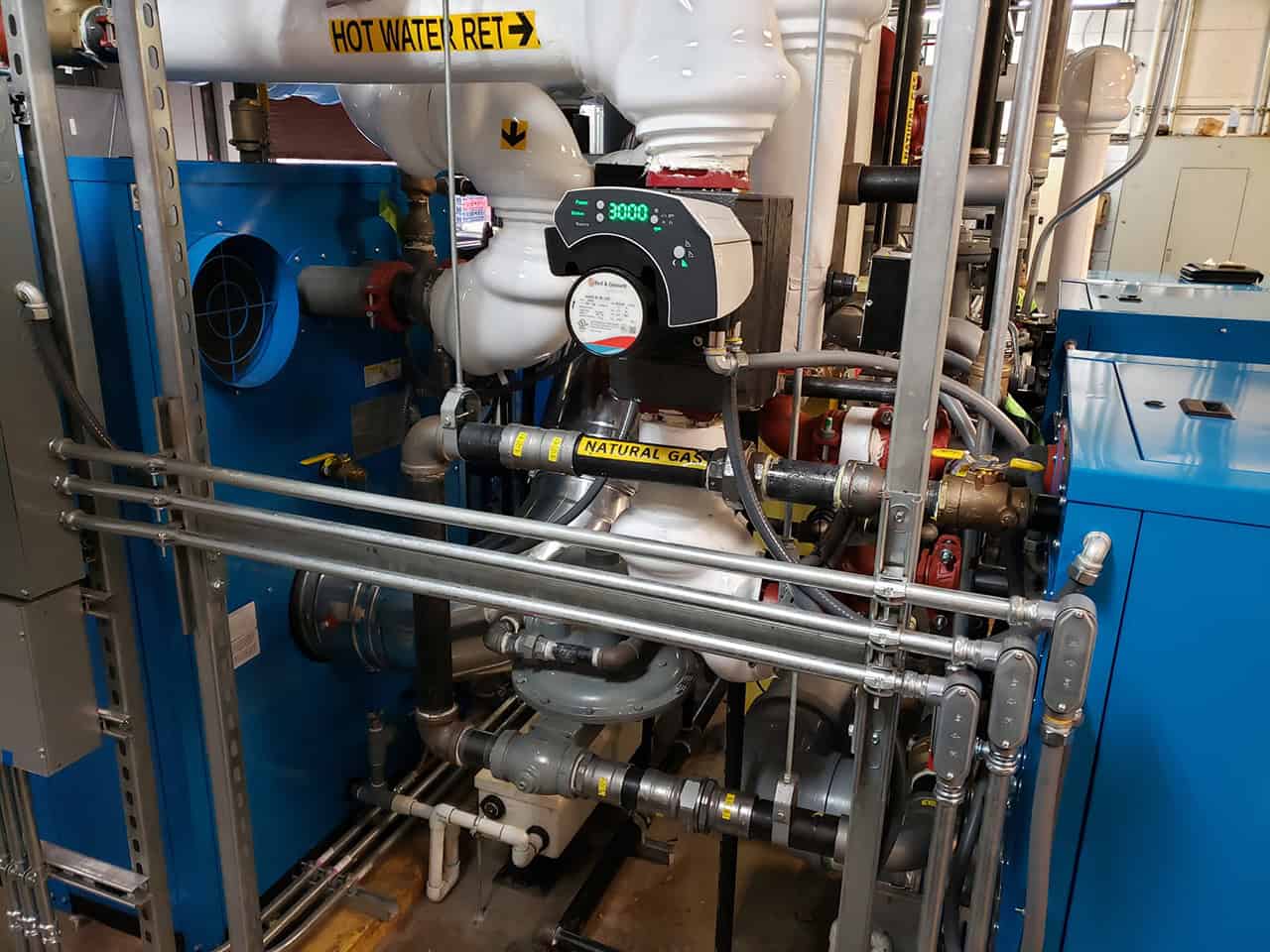
For steam boilers, the pressure will determine how often it should be serviced:
- High-pressure/PSI boilers (16 lbs PSI and above) should be professionally serviced annually.
- Low-pressure/PSI boilers (1-15 lbs PSI) should be professionally serviced every 2 years.
Parts to Get Familiar With
For facility managers or others in charge of regular boiler maintenance, knowing the components of your system will help you quickly find a routine that works best for your boiler. Below are some common components you should get familiar with:
- Safety release valve: a critical safety component that helps regulate pressure levels in the system. It is designed to open and release excess pressure when the pressure within the system exceeds a certain threshold.
- Safety controls: some of the most important parts are the safety controls. Every boiler has a set maximum pressure level, so if that level is exceeded, the fuel supply will automatically be cut off.
- Burner: this provides a large amount of heat – enough to turn water into steam inside the boiler – by mixing air and fuel, creating a combustion.
- Sight glasses
- Water sight glass: this is a transparent tube that reflects the level of water within the boiler.
- Flame sight glass: similar to the water sight glass, a flame sight glass allows you to see the flame level in the boiler and ensure it’s burning properly.
- Pressure gauge: on the front of your boiler, this gauge shows the pressure of water leaving the boiler.
- Blowdown valve: this valve allows for solids to escape.
- Pilot assembly: provides a flame that lights the boiler’s main burner by connecting it to the gas valve.
- Flame scanner: a sensor that checks for the presence of a flame and responds accordingly. If no flame is present but fuel continues to build up, it could lead to an explosion.
- Water level controls: these monitor the water level, open the feedwater valve, or start a pump to add more water as needed. Types of water level controls include float, probe, or differential pressure.
- Level controls: these detect the water level in the boiler to regulate the proportion of water and steam demand.
- Boiler control system: as the name suggests, this controls the operations of the entire boiler, including both software and hardware components. This ensures that everything is running smoothly, safely, and efficiently.
Boiler Maintenance Checklist
General Maintenance Tips
- Keep your boiler room clean and mess-free. Boiler rooms can easily become a place where miscellaneous junk, pieces, and parts get stored. There should be ample room to move around – in case of an emergency and as good practice.
- Always practice caution. Workers around the system should wear protective clothing. Daily safety checks should be employed, especially to inspect water levels.
- Keep electrical components in place. Moving a wire or electrical connection the wrong way can impact the functioning of the boiler and lead to a safety risk.
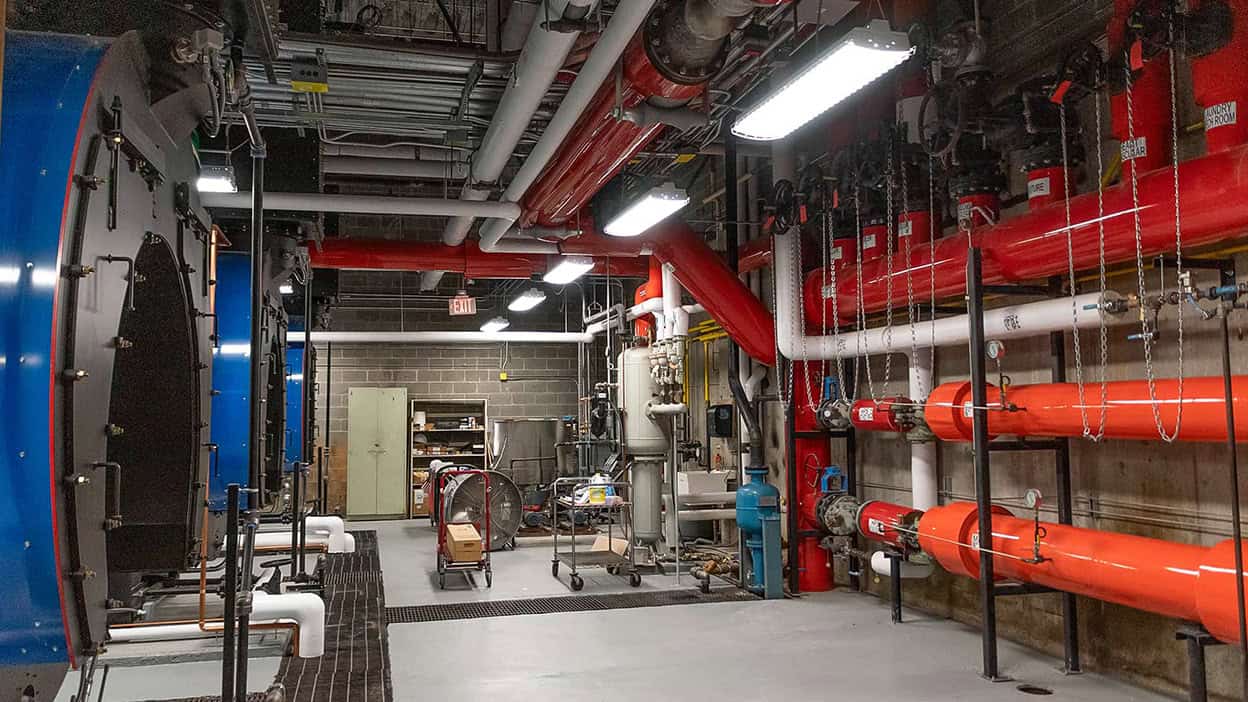
Throughout your periodic maintenance checks, be sure to keep a log of all routine maintenance, emergency repairs, or other noteworthy items. When maintaining your system, review any manufacturer-recommended maintenance that may be required in addition to the items below.
It’s also important to remember that your boiler will need different intervals of maintenance depending on the season. In-season maintenance occurs typically from late fall to early spring when a building needs to be heated. While it’s running, you can expect more maintenance needs. Out-of-season just means that the boiler is not in use, and will need less maintenance.
Daily Boiler Maintenance
- Check the water level gauge for low water – this can be one of the biggest safety risks.
- Inspect the low water cutoff to ensure that the system will not operate below a certain water level.
- Drain the gauge glass.
- Inspect your equipment for water leaks that may be coming from inside or outside the system.
- Remove any debris or obstructions around the vents.
- Check the flame for any soot or damage.
- Ensure there are no service codes or errors on the display panel.
- Test your control system by turning off the burner control switch and monitoring its response to no flame.
- Perform a bottom blowdown to clear the system, at least once a day.
- Listen for abnormal noises coming from the system.
- Maintain the lube oil level for the compressor.
- Maintain treatment of the feedwater, including dealkalizer if applicable.
- Review the pressure and temperature readings to ensure that they’re in a safe range.
Weekly Boiler Maintenance
- Test alarms, evaporation, and the pressure gauge.
- Inspect linkages on the automatic draft controllers as well as the burner controls.
- Check the air damper on the burner.
- Maintain the valve operation in the gas train.
- Review the pilot and igniter, paying careful attention to the condition of the flame.
Semi-weekly
- Clean the oil filters and air filters.
- Flush drain low water cut-offs/sidearm oil pre-heater.
- Inspect and clean debris off of smoke detectors.
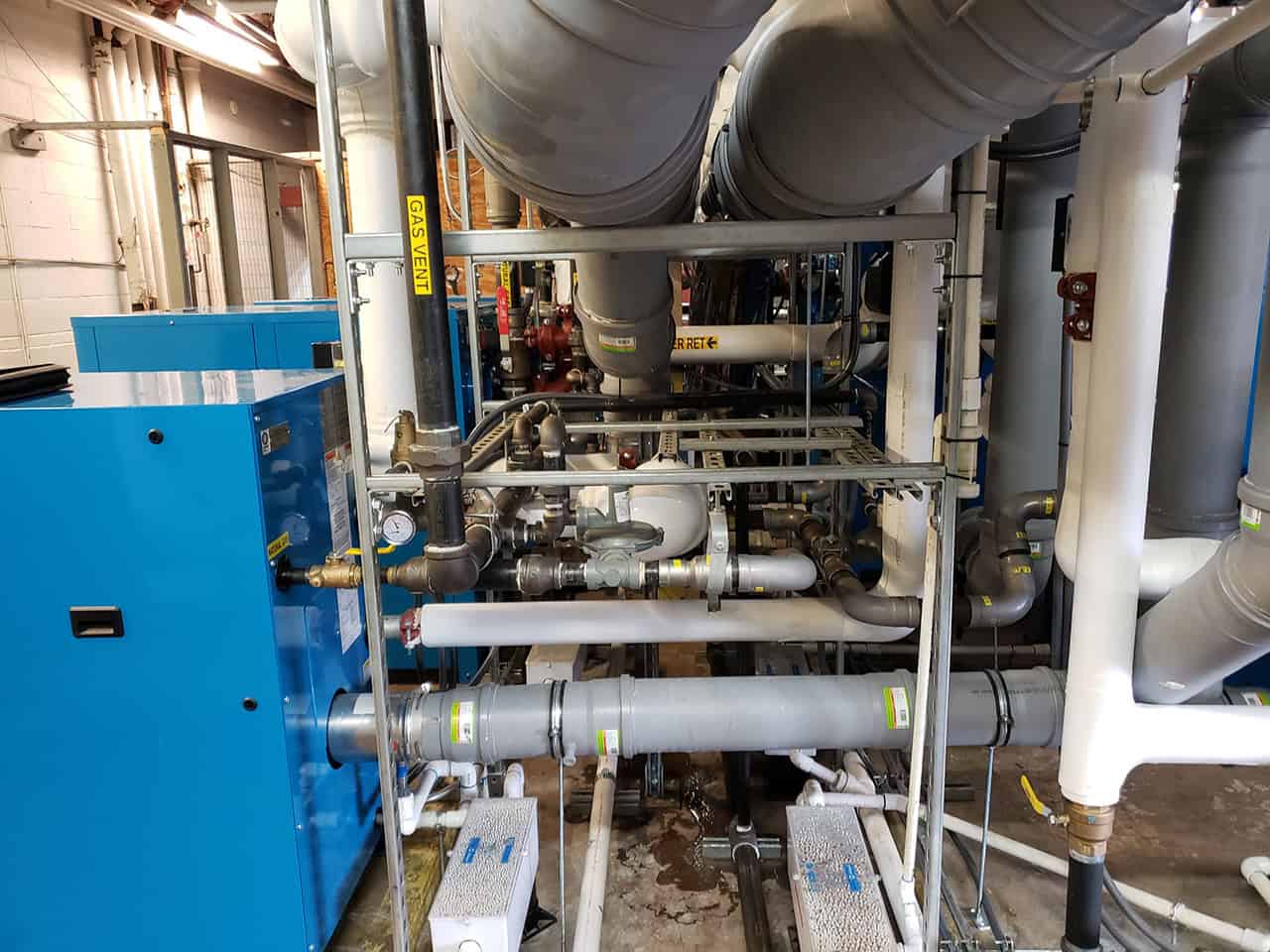
Monthly Boiler Maintenance
- Test the flame detection and limit controls.
- Check the relief valve, drain lines, and flue gas vent for leaks.
- Examine the outside of the boiler for debris, leaks, or hot spots.
- Confirm chemicals are at the proper level.
- Ensure belts are in good condition and gaskets are on tight.
- Inspect floor drains for proper functioning.
- Look for any air leakages around openings.
- Verify blowdown separator and cooler operation.
Annual Boiler Maintenance
If you haven’t already scheduled maintenance with a professional, this is the time to check in with them. Some of the items below will be better suited for a professional to handle, while other items you may be able to do yourself.
- Tune up settings and burners.
- Clean the waterside and fireside, looking for corrosion or scale from the water and soot from the fire.
- Monitor fuel oil levels.
- Refurbish and clean the low-water cut-off mechanism.
- Calibrate and/or test safety settings and operating controls.
- Monitor water pH levels.
- Clean the burner assembly and ignitor.
- Perform a hydrostatic test to check for any potential leaks.
- Check the vent terminations and air inlet for obstructions.
- Clean the tubes and tube sheets.
- Ensure the boiler’s refractory (heat-resistant lining) is intact and clear of any broken parts.
- Review certifications and condition of safety valves.
- Perform leak tests on your gas train, looking for bubbles that indicate a leak.
- Inspect the exterior for any damage or corrosion.
- Examine the condensate system.
- Review the quality and condition of the system’s insulation.
- Re-lubricate moving parts as needed.
- Inspect the hydronic pipes, heat exchanger, and venting system.
Keeping Your Commercial Boiler Healthy
From daily checks to monthly inspections and annual cleaning, preserving the life of your facility’s boiler is essential to saving costs, reducing safety risks, and increasing the efficiency of your system.
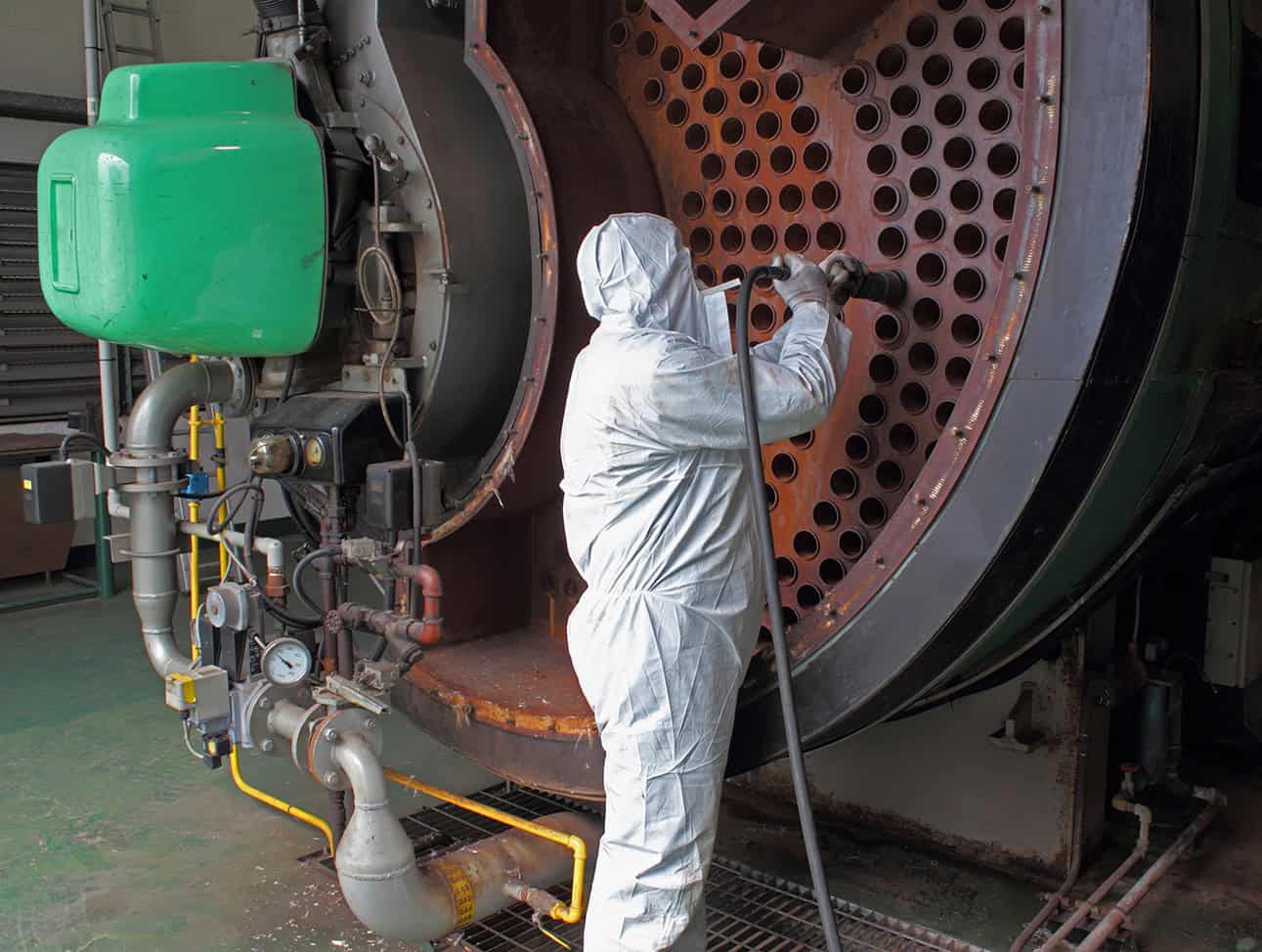
If you’re in charge of keeping up with your boiler, be sure to get familiar with any parts that need regular maintenance and partner with a specialized professional to make any repairs, service, or maintenance easy.
It’s also important to keep track of all daily, weekly, monthly, and yearly maintenance performed so everyone who plays a role in the boiler’s care knows what to expect and can spot potential issues before they arise.
RBI is a premier full-service plumbing, mechanical, service, controls, and design-build company. We provide custom services tailored to meet your needs and requirements at each stage of your facility’s journey, from helping you find the right boiler equipment to installing and maintaining your system for years to come.
Commercial Boiler Services from RBI
- Cleaning & Inspection
- Burner Setup & Maintenance
- Combustion Flue Gas Analysis
- Refractory Repair & Replacement
- Tube Testing & Replacement
- ASME R Stamp
- Boiler Replacement, Retrofit & Rentals
